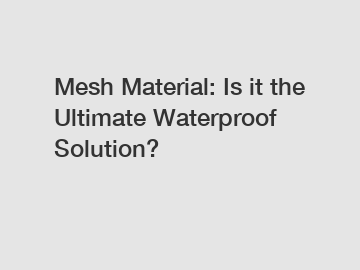Mesh Material: Is it the Ultimate Waterproof Solution?
Mesh Material: Is it the Ultimate Waterproof Solution?
When it comes to keeping things dry, waterproof materials are essential. Whether it's raincoats, tents, or even phone cases, having reliable waterproofing can make a huge difference in protecting valuable items from water damage. One material that has gained popularity in recent years for its waterproof properties is mesh. But is mesh material truly the ultimate waterproof solution? Let's explore the advantages and limitations of using mesh as a waterproof material.
Advantages of Using Mesh Material for Waterproofing.

1. Breathability: One of the key benefits of using mesh material for waterproofing is its breathability. Unlike solid materials, mesh allows air to circulate, preventing moisture buildup inside and reducing the risk of mold or mildew formation. This feature is particularly beneficial in applications such as outdoor jackets or shoes, where comfort is crucial.
2. Lightweight and Flexible: Mesh material is incredibly lightweight and flexible. This makes it an ideal choice for various applications where mobility and agility are important. From backpacks to camping tents, using mesh as a waterproofing solution ensures that the gear remains lightweight and easy to carry without compromising on protection.
3. Versatility: Mesh material is highly versatile, making it suitable for a wide range of waterproofing needs. It can be used as an outer layer for raincoats or as a lining material to provide an additional layer of protection against water. Mesh can also be found in the construction of water-resistant bags, shoes, and even electronic device covers. Its versatility makes it a popular choice among manufacturers across different industries.
Limitations of Using Mesh Material for Waterproofing.
1. Limited Waterproofing: While mesh material offers some level of water resistance, it is essential to note that it is not entirely waterproof. Mesh often has small holes or openings that can allow water to pass through, especially under heavy rain or prolonged exposure to moisture. Therefore, relying solely on mesh material for complete waterproofing may not be ideal in extreme conditions.
2. Require Additional Layers: To enhance the waterproofing capabilities of mesh material, additional layers or coatings may be necessary. This can add complexity and cost to the manufacturing process, making it less efficient compared to other waterproof materials available in the market.
Closing Thoughts.
While mesh material offers several advantages such as breathability, lightweight, and versatility, it may not be the ultimate solution for waterproofing needs. Its limited waterproofing capabilities and the need for additional layers make it less suitable for extreme weather conditions or situations where complete water resistance is required.
When considering waterproofing options, it is important to assess the specific requirements of the application. Mesh material can be an excellent choice for light rain or moderate moisture, but other materials like PVC or Gore-Tex® may provide better protection in harsher conditions.
In conclusion, mesh material can be a valuable component in waterproofing solutions, but it may not be the ultimate answer for all waterproofing needs. By understanding its advantages and limitations, individuals and organizations can make informed decisions when choosing the right material for their specific requirements.
For further information on waterproofing solutions or to discuss your specific needs, please feel free to contact us. Our team of experts is always ready to assist you in finding the most suitable options for your waterproofing projects.
The company is the world’s best birds eye material, mesh fabrics suppliers, fabric for tents supplier. We are your one-stop shop for all needs. Our staff are highly-specialized and will help you find the product you need.
227
0
0

Comments
All Comments (0)